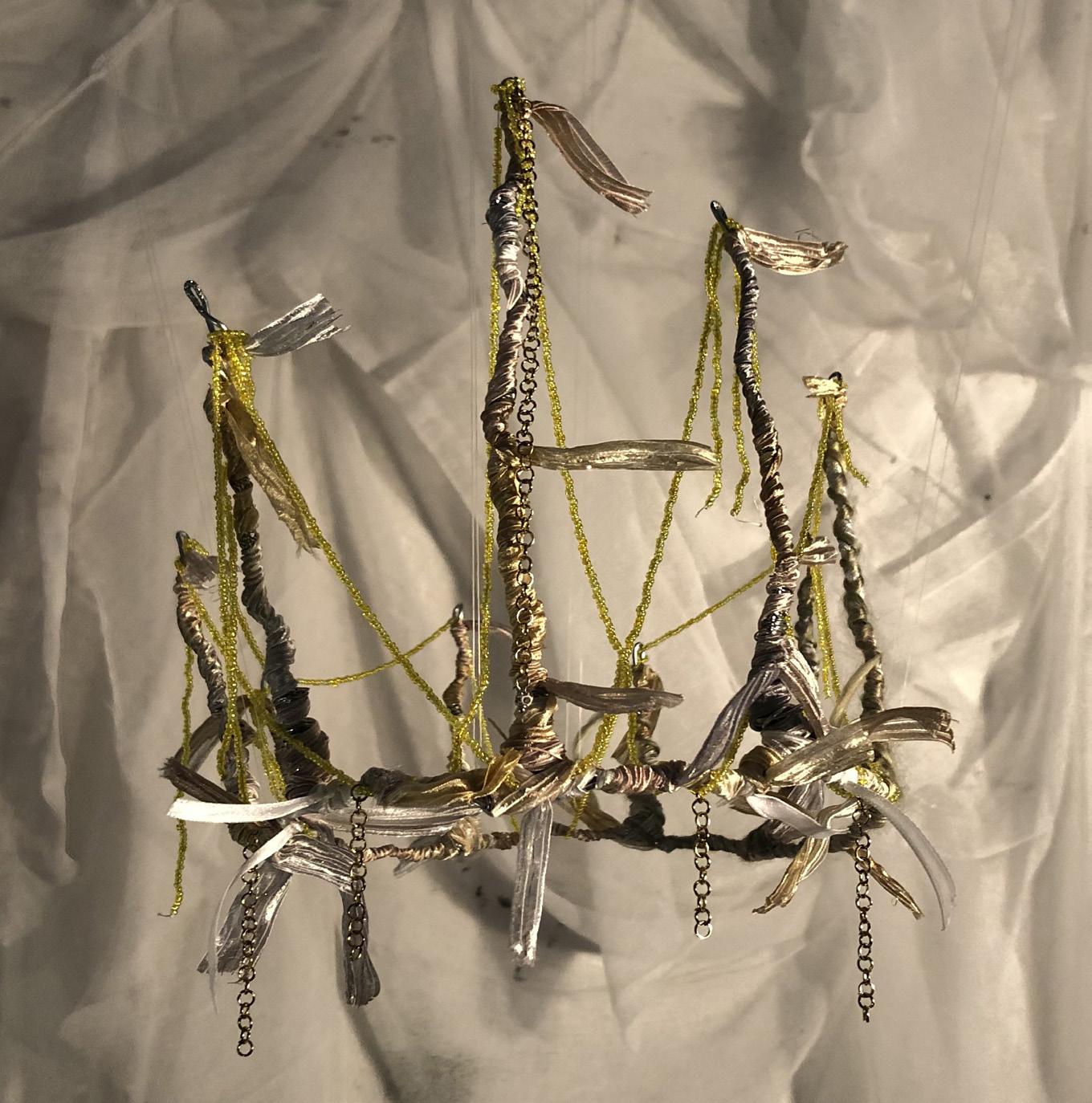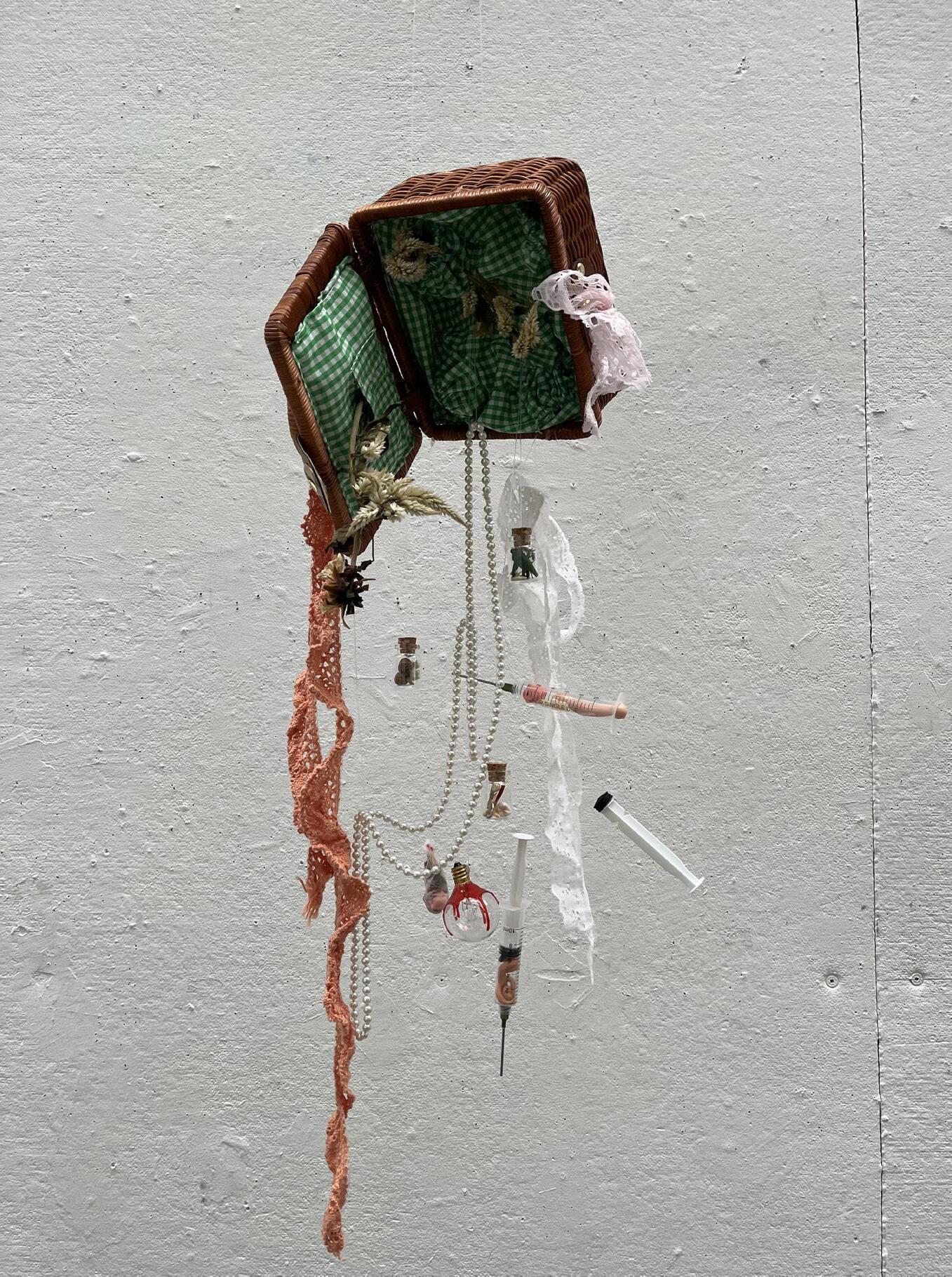
4 minute read
K. Annie Bingham
Intertidal Wet Dream
Watercolors, 6x6 inches
Advertisement
K. Annie Bingham
THE NIGHT IS THE PORTAL, THE EXCUSE, THE BLANKIE, THE CLOAK Encounters In Quarantine, Nepal
Unwanted viscera doggy-bagged, dogs in packs, tobacco packets in the puddles of late monsoon: all that rose from the streets and saturated my body when I stepped through the night again. When I returned to my cot I couldn’t shake the presence of someone blue jabbing into my side, all cheekbones and wrist-knuckles, someone infuriatingly unconscious cresting my unrestable body. When I am restless, this is who I wrestle with. My cot felt so hard I must have slid onto the floor, but it pinched under me still, reverberating with my heat, compressing the hardwood floor below me and the hardwood within the cotton sack of me, my piecey bones, which I think would creak if unmuffled. At some point, the clock stopped ticking.
I’m a little cat again. When I see the little cats, I don’t feel so bad about also pacing, sitting, tilting my ears towards the stovetop, waiting for milk. Man Bahadur (Brave Soul) asked me if I wanted milk and I lied and said I didn’t.
My next guest was a writer. He hovered above and to the left of my horizontality, gesticulating through his teeth. He must have been clenching his eyebrows together to manifest blood flow in his third eye, or let it merge into a monobrow. I could see his long, thin fingers: waxy moons at the base of each nail bed. I knew him from a video on my laptop. In the video his voice was so soft I thought he was pretend—pretending like disjointed flower petals all sitting there on the base, waiting to be picked whole and flutter into pieces. The lengths of his fingers served as stilts from which the crown of each could preach. The fingertips wobbled with height and caught themselves periodically on the glass between us. While the writer glowed across the screen, the bugs splayed still.
Brennan
I have been trying to articulate why being at the restaurant was when we were most like family. Why when we got home, our lives stopped overlapping. Trees that crowded the backroads turned a spritely green and froze over again, and on particularly windy nights we had to take the long route, martyred branches sheathing our way home. With you, everything has a reason.
Year after year in your blue Toyota, we took the winding roads too fast, imagining a world where we lived in one of the mansions on the lake. When I set the table now, it is with a sense of pride. I know, despite common sense, that the fork goes on the left and the knife goes on the right. We’d discussed the incongruity of this many times on the slow Sunday drive to work.
•
I was nine when you first taught me there was a place for everything, an order: placemat, creased paper napkin to the right, utensils laid in a neat row on top, a vessel for accompanying liquidation at four settings. We did this every night. At the time, trivets were of the essence—we brought everything to the table. Starch, veg, salad dressing, salt and pepper, and a green glass bottle for you.
I took the tops off for you. I collected the shiny omens and bound them into a coaster. The syrupy hot glue coated my fingertips with a slight sting and I took great satisfaction in peeling it off. I gave you the coaster for Christmas. I wondered if it was proof that we could see each other.
•
Our nightly congregation was a gamble—as if there were landmines in the mashed potatoes. You sat at the head of the table in your infinite solitude as we spun out chaos. My mother insisted we pray before eating. My sister’s rapid speech shortened to fractured sentences once she realized it was safer that way. Forks flew across your grandfather’s handmade napkin holder. I tapped my nails repeatedly against my water glass, hoping you’d let me excuse myself without finishing my mushy carrots. You and I would sit for hours, stomachs full on on a stubborn refusal to compromise. For better or worse, I was your mirror.
As we aged, we stopped bringing food to the table. We left everything in the kitchen to streamline the cleanup. Shared meals got quicker, rarer, and more volatile. I ripped my hair out between soggy gasps for air and you told me it was bad etiquette.
•
At the restaurant it was different. Behind the line, we made efficiency out of the chaos, in all of its familiar and familial forms. Sometimes, I fear I’ll be pouring myself into the pleasures of strangers for the rest of my life, and so your fate will become my own. Or maybe I am more afraid of what happens if I stop. Who are we if not mise en place and meat temperatures and sushi mats?
The final summer I spent tucked into the corner of that industrial kitchen, a mistake was death. The grill left scabbed burns on my wrists. Melted butter from sautée pans was endlessly forged into my pores. I could hear the sound of the ticket machine printing morse code into my dreams. When I was out to eat, I had to stop myself from standing at attention when I heard a bell from the kitchen.
You thought I should know better. I knew what you taught me. How to grill a burger to a mouth-watering medium rare: focus on your voice, memorize how long five minutes takes, even when it’s forever, keep the sweat from my forehead contained by a tight bandana, always have backups, tuck my knuckles in before making the first cut.
•
We ran the soft-shell crab special in July. We held them over the sink wearing latex gloves and sunk dull scissors into their faces. All the ruined eyes looked up at me blankly from their stainless steel limbo. The bartender filled a plastic quart container with soapy beer from the tap. We added flour and dunked the crabs in one by one, tapping the excess mixture off of limbs like wet sand from fingers.
When I sacrificed them to the fryolator, I thought I could hear them screaming. It was, technically, the fervent rejection of their water-filled bellies to the bubbling ochre.
•
Hot oil spattered my exposed wrists. I swallowed my own internal waters with stoicism. My station was always searing alive, but I carried on, meticulously cutting turkey clubs into quarters and garnishing entrees with fresh herbs as puckering remnants of heat bubbled beneath my skin. Your guidance to run the blisters under cool water came exacted and even. Your hands never stopped moving with precision as you spoke.
I noticed there was a solidarity in our forearms, the way our flesh was imbued with deep pinks. We must have shared a secret revel in how our scars defined us. Tethered by those badges of honor, the way they proved our type of damage was hard won.








